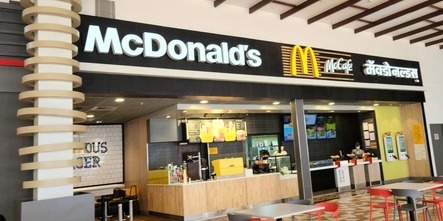In the central Indian city of Bhopal, 12-year-old Hashir Ahmed and his brother Ashaz use the website bdnaash.com to check beverage brands before making purchases. They wish to avoid products from companies that support Israel. The brothers rely on this resource for all their purchases at local stores, whether it's chips, biscuits, or chocolates.
"We've seen the difficult situation in Gaza. Many innocent children and adults have suffered. The least we can do is avoid products of companies that support Israel and its allies," Ahmed tells Salaam Gateway.
Although they are unaware of the origins of bdnaash.com, they've been using it for nearly a year since the escalation of the crisis in Palestine. They didn't initially understand the broader implications of their choices, but they are pleased to have stopped frequenting places like McDonald's and have not purchased brands like Lays and Uncle Chipps for quite some time.
Strong support in Kolkata, other cities
The sentiment is also resonating with adults, and across other cities, such as the eastern Indian town of Kolkata.
The Concerned Citizens of Kolkata launched their initiative with a week-long campaign titled the ‘7 Days 7 Products Boycott Movement’ last year. This was soon followed by another initiative called ‘40 Days 40 Products.’
Dr. Sarfaraz Adil, a physician and a member of the group that launched the campaign, explained, “The key aspect of this campaign was encouraging people to boycott 40 specific products while providing them with alternative brands that are locally made in India.”
“The campaign is ongoing, and many participants, primarily from the Muslim community, have ceased using products associated with Israel and the US government,” Dr. Adil tells Salaam Gateway.
The organization of this campaign was unprecedented for a city with a population of nearly 16 million, making it the third-largest city in India, he noted. As a result of the boycott, production of a local detergent powder – Zill - began in Kolkata to fill the gap left by the products people were choosing to avoid. While its production is currently limited and it is only available in Kolkata, it is gaining traction among users.
Similar sentiments trend across Jammu and Kashmir, India’s only Muslim-majority region, where a boycott of products associated with Israel is gaining force.
“We stopped using such products. While we may not be able to do much for the people of Palestine, we can show our support through this boycott,” Adil Hashmi, a local resident of Srinagar, the capital of Jammu and Kashmir, tells Salaam Gateway.
Asif Mujtaba is a shopkeeper in a Muslim neighbourhood in Nagpur in the western state of Maharashtra. Since October of last year, he has shifted to stocking only Indian-produced items in his grocery shop. Soft drinks like Coca-Cola and Pepsi, once favorites among the youth, are no longer sold.
“I don’t want to sell those products because the money we spend indirectly supports Israelis. Even young children have stopped buying these products in solidarity with their brothers and sisters,” Mujtaba explained.
In India, which has nearly 211 million Muslims - making it the country with the third-largest Muslim population after Indonesia and Pakistan - calls to boycott products that support Israel have been ongoing since the crisis escalated last October. The conflict has killed more than 41,000 Palestinians thus far.
Technology facilitates purpose
Over the past year, several apps have emerged in India to help consumers identify products and their connections to Western companies. While not all Western companies are boycotted, those perceived to be close to Israel are facing significant backlash from the Muslim community.
“Although these apps are used by only a small percentage of people, they have attracted a notable number of users. For instance, the No Thanks app has been downloaded over a million times, and the Boycat app is estimated to have diverted over $2.5 million from companies linked to Israel,” said Mohammed Sinan Siyech, a non-resident associate fellow at the Observer Research Foundation in his research.
According to the 2024 Edelman Trust Barometer Special Report, Brands and Politics, over 55% of respondents in Saudi Arabia, Indonesia, India, and the UAE indicated they boycott brands that take a side in the conflict, a sentiment directly tied to the Israel-Palestine crisis.
Approximately three-quarters of respondents in Saudi Arabia, Indonesia, and India reported that they are purchasing more local brands instead of foreign ones compared to a year ago.
India-Israel trade relations
India is Israel's second-largest trading partner in Asia, with bilateral trade reaching $6.53 billion (excluding defense) in FY 2023-24. However, this figure has seen a decline due to regional security issues and disrupted trade routes, according to the Indian Embassy in Israel.
The relationship between India and Israel has strengthened significantly since BJP's leader Narendra Modi became premier in 2014. Reports indicate that India has been exporting weapons and military equipment to Israel amid the ongoing conflict in Gaza. The Supreme Court of India recently dismissed a Public Interest Litigation that sought to stop arms exports to Israel, stating that it cannot interfere in matters of foreign policy.
The Water Transport Workers Federation of India, which represents more than 3,500 workers at 11 major ports across the country, has announced that its members will not handle weaponized cargo originating from or destined for Israel, as well as any other nation involved in transporting military equipment to Palestine.


Shuriah Niazi